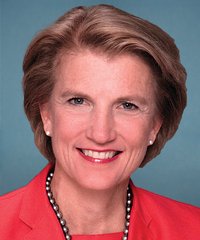
West Virginia Senator Shelley Moore Capito believes that today's challenges demand bipartisan solutions. She supports commonsense policies that promote economic growth, unleash energy potential, lift up working families, and build a better West Virginia for the next generation.
From growing up in Glen Dale in the Northern Panhandle, to representing the 2nd Congressional District from the Ohio River up to the Eastern Panhandle, to raising her family in Charleston, Shelley knows the ins and outs of every region of the state. Early in life, Shelley saw how her father, Governor Arch Moore Jr., instituted changes to improve West Virginia—building up not only infrastructure and the economy but also families and state pride. It’s that mindset that inspires her work today.
For the past several years, West Virginia has had the highest number of opioid-related overdose deaths in the nation. This crisis has ravaged the state, destroying thousands of families.
Soon after joining the Senate, Senator Capito convened a successful drug prevention summit in Martinsburg, West Virginia to bring more national attention to this very serious problem. The takeaway was clear: there is a desperate need for substance abuse treatment facilities in the state. The lack of treatment options is not only a problem for those suffering from addiction. It impacts businesses seeking to hire new workers and help employees in need of treatment, and it hurts homeowners concerned with declining neighborhoods and home values
In addition to improving drug addiction treatment, Senator Capito understands the need to take steps aimed at cutting off the drug supply chain. She joined her colleagues in introducing the STOP Act to prevent the shipment of synthetic opioids – like fentanyl – into the United States through the international mail system and was proud to see it signed into law by President Trump in 2018.
As ranking member of the Homeland Security Appropriations Subcommittee, Senator Capito has fiercely advocated for strong border security, including a wall, advanced technology at ports of entry, and increased funding to help stop the flow of deadly drugs coming across the southern border.
Senator Capito has also been an advocate for some of the youngest victims of the opioid epidemic. She introduced the CRIB Act to ensure care for infants with neonatal abstinence syndrome in residential pediatric recovery centers – like Lily’s Place in Huntington, West Virginia – and the RISE from Trauma Act to increase resources for communities to support children who have experienced trauma.
Senator Capito played an influential role in crafting the SUPPORT for Patients and Communities Act, the largest comprehensive addiction response legislation ever. West Virginia has served as ground zero for opioid recovery efforts. Programs and techniques—such as Quick Response Teams (QRTs), developed and proven to work in West Virginia—were used as a model for other parts of the country. President Trump signed the SUPPORT Act into law in 2019.
Recently, in addition to advocating for and securing funding to increase access to treatment and recovery options through her role on the Appropriations Committee, Senator Capito authored the NO PAIN Act, which aims to address barriers to non-opioid pain management for those enrolled in Medicare.
She also cosponsored the Family Support Services for Addiction Act that would provide $25 million in grant funding to help nonprofits and community organizations provide support services to families with loved ones seeking addiction treatment.
Senator Capito also authored the Improving Treatment for Pregnant and Postpartum Women Act, which would help fund treatment programs for pregnant and postpartum women.
In the FY22 appropriations bill that was signed into law, Senator Capito secured funding targeted for specific projects and programs aimed at assisting law enforcement and getting those struggling with addiction the help they need.